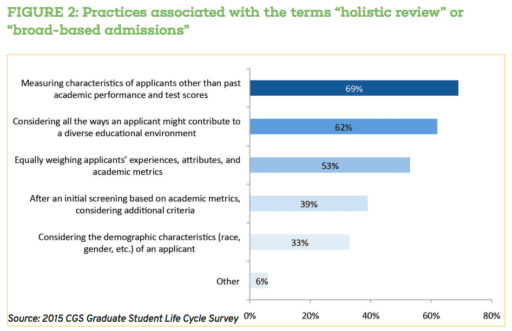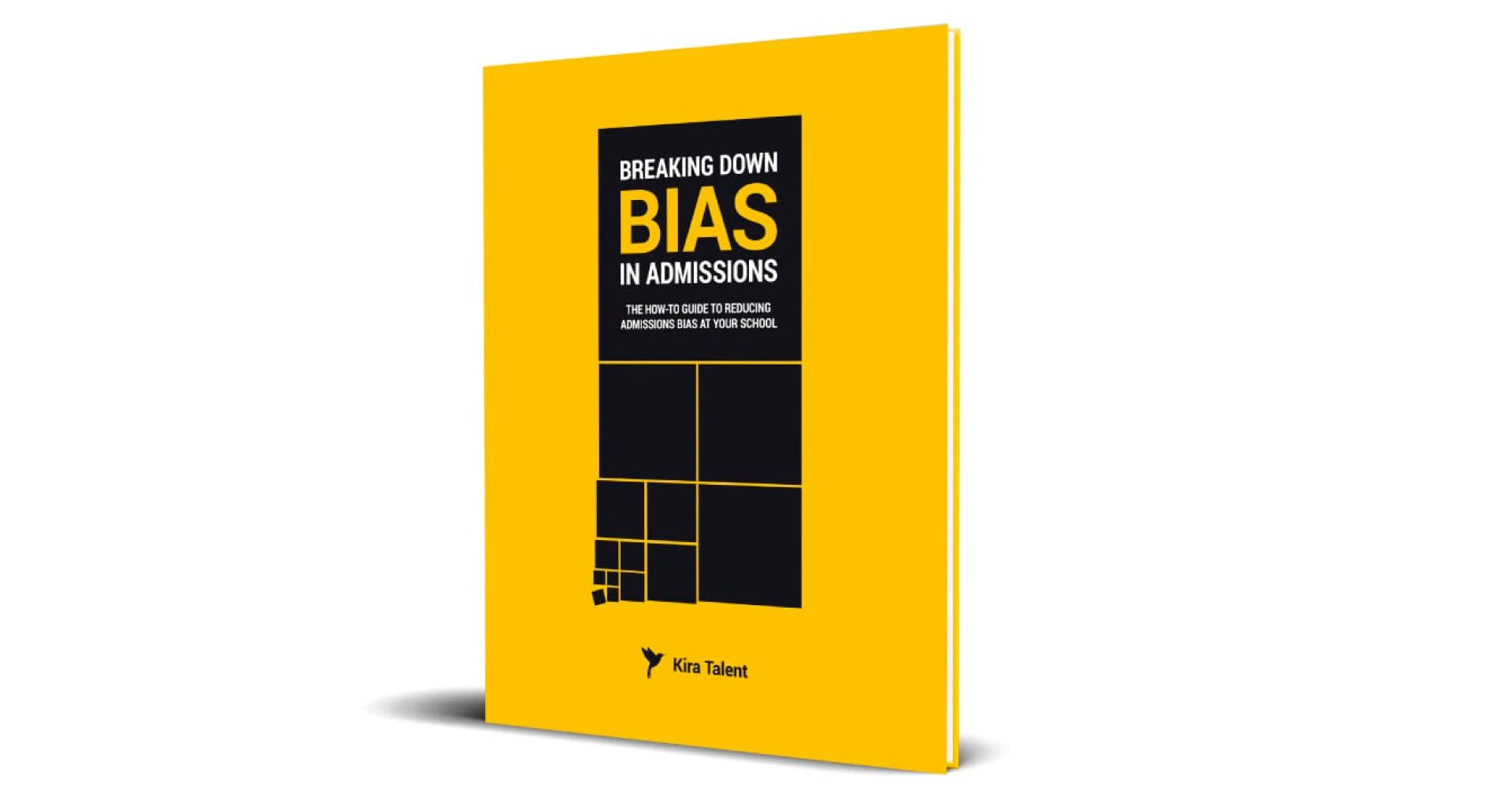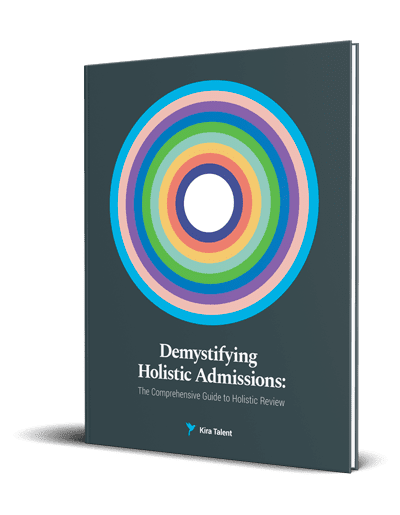"Holistic admissions" has been around for quite some time, but it hasn’t always had the same connotation that it does now — so how did we get here?
Let’s dive into the not-so-pleasant history of holistic admissions and explore how it has (thankfully) evolved since then.
What Does Holistic Admissions Mean?
Holistic admissions is a method of assessing applicants beyond test scores and grades.
Because there’s no one way of doing it per se, the implementation varies from school to school. However, there’s a consensus in higher ed that holistic admissions flips traditional admissions on its head.

In 2015, the Council of Graduate Schools (CGS) surveyed institutional practices related to the graduate student “life cycle,” including the graduate admissions process. Read more here: https://cgsnet.org/publication-pdf/3495/CGS_HolisticReview_final_web.pdf
Through holistic review, schools look at academic performance paired with extracurricular activities, noncognitive traits, personal experiences, and sometimes even more criteria.
The motive behind this approach is to get a better view of the applicant as a whole.
By getting a more complete view of the applicant — based on more data points — schools have found they can improve class engagement, retention, and the diversity of their incoming classes.
However, as history shows us, holistic admissions has not always been used for such well-intentioned reasons.
An Origin Story: The Early Days of Holistic Admissions
Once upon a time, there was an admissions team at Harvard that seemed keen to a certain type of student – Protestant men from elite upbringings.
But then one day in 1905, that trend saw a swing in direction due to the arrival of the College Entrance Exam.
As the new basis for admissions, the entrance exam made the college dream possible for anyone with the grades and financial resources needed to attend. This lead to a shift from St.Grottlesex-type recruits to a more diverse pool of applicants.
For Harvard’s administration, the celebration of this new found diversity was shortlived.
After a few years with this grade-based admissions policy, they became unhappy with the increase in Jewish students on campus.
By 1922, this group of so-called ‘undesirables’ accounted for more than a fifth of Harvard’s freshman class. The rates were soaring because their scores on the entrance exam were astonishingly better than other applicants.
In response, Harvard changed their admissions criteria once again.
Enter the new ‘holistic’ aspect of Harvard’s admissions, which required personal essays, letters of reference, assessments of “manliness”, and evidence of extracurriculars.
The problem is that this change wasn't made for the right reasons.
It wasn’t done to see applicants through a wider, more holistic lens. It was done to dilute the value of pure intellectual accomplishment in hope of weeding out certain, well-deserving students.
Onwards in history, similar trends in “holistic admissions” have raised suspicions of a new quota — but this time against Asian applicants.
Moving Forward: 21st-Century Holistic Admissions
In 2014, a lawsuit organized by the Students for Fair Admissions was brought against Harvard, alleging that Asian American applicants were being discriminated against.
Today, the battle continues.
The anti-affirmative action group claims that Harvard’s ‘holistic’ admissions is just a guise for a process that places higher standards and racial quotas on Asian Americans.
Whether or not this is true is a matter up to the courts, and so only time will tell.
In the meantime, it has a lot of schools questioning their admissions process. They want to know what they can do to ensure diversity, student success, and other important targets.
In 2016, CGS published a report calling for more graduate schools to adopt holistic practices. Around the same time, the Harvard Graduate School of Education's Making Caring Common project released a report on how undergraduate admissions focus entirely on the wrong things.
Making Caring Common argues that admissions practices encourage selfishness and mental health strain. The report encourages schools to overhaul admissions to focus on character, kindness, and other non-cognitive traits.
Over eighty key stakeholders in college admissions endorsed this report, agreeing that something needs to change.
Fortunately, a truly holistic review can help achieve these goals.
As seen with schools like Virginia Tech, taking a holistic approach has three key benefits:
1. Increased diversity
When Miami University began looking at applicants based on their unique experiences and non-cognitive traits, the results were remarkable.
In a seven-year span, Miami U saw the number of applications from visible minorities increase by 116% and in turn, visible minority enrollment grew by 95%.
2. Better evaluation of fit, potential, and soft skills
In 2003, the Boston University School of Medicine began their transition from a traditional admissions process to a more holistic one. It took nearly five years to complete the implementation which included procedure restructuring and faculty training.
By 2012, the characteristics of their incoming classes were notably different than those of previous years. The students brought in through a holistic process were more engaged with the community, more collegial, and more open to new ideas and perspectives.
3. Improved retention
Oregon State has been evaluating students holistically since the early 2000s.
Their method has been to create an Insight Resume on each applicant. This process requires applicants to answer six 100-word questions designed around the traits the school deems essential for student success.
Using this method, Oregon State found that for every one-point increase on an applicant’s Insight Resume score, the likelihood of that student staying in college increased by 10%.
What Lies Ahead?
Evidence is mounting to show the value in considering non-cognitive variables over test scores.
Because of that, the rise of holistic admissions will continue.
Although we won’t wake up tomorrow and find that every school has implemented a fully-holistic admissions policy, I’m confident that we’ll keep seeing holistic initiatives and trends, like the test-optional movement, gain momentum.
At risk of being called a dreamer, I’ll say that we can aspire to have a fair and truly representative admissions process for all. One that allows them to show who they are as a person, rather than just a number.
Maybe not tomorrow, but one day — and we’ll have holistic admissions to thank for it all.
Music attribution: "Waves" by Makaih Beats, used under CC / Remixed from original



